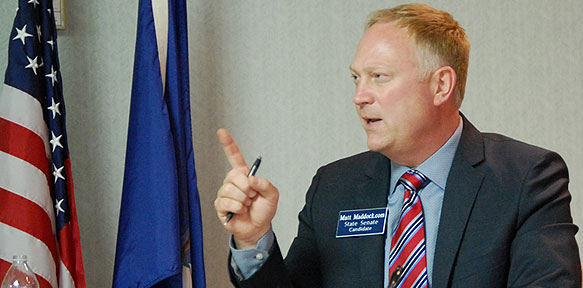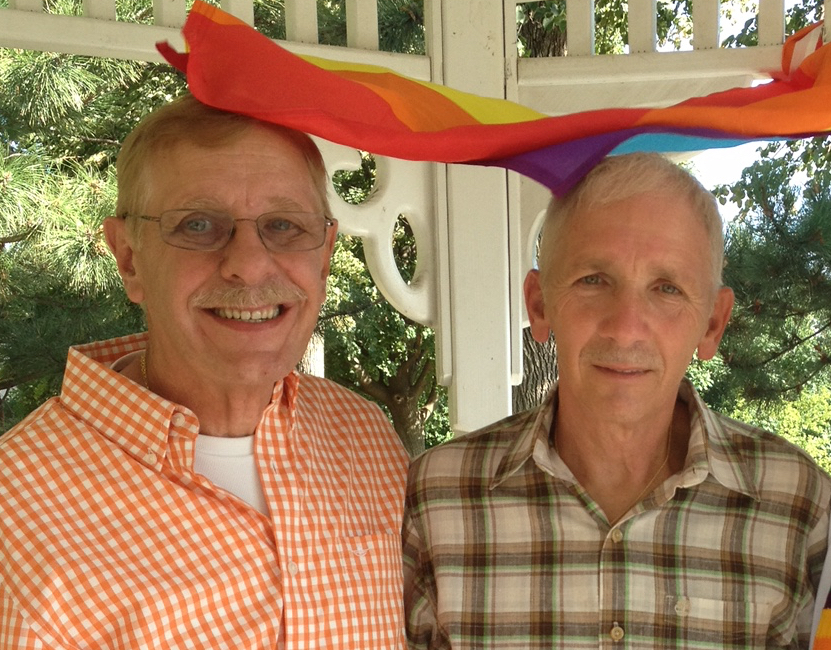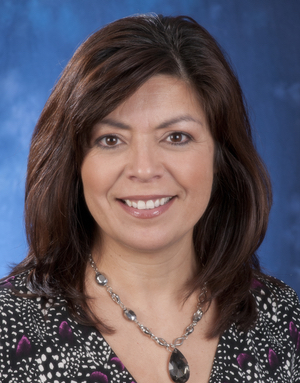Sticking with your own kind: tribalism in politics
So here we are in Michigan, a few days away from a primary election, and Matt Maddock is considering something he hasn’t often thought about – how he would feel if one of his children married someone really ...different.
First he says it wouldn’t happen, because he’s raised them well. But when pressed to consider the question, purely hypothetically, he answers.
“I would be disappointed,” he said. “But I want my children to be happy. I have many friends who are married to a person who is on the other side, and some marriages are just fine with that sort of difference.”
At this point, Maddock, a 50-year-old bail bondsman in Milford, in Oakland County, sounds like he’s talking about the sort of opposites-attract pairing people have made movies about, films about race or religion, with comic misunderstandings and bigoted grandmothers – “Guess Who’s Coming to Dinner,” say, or “Annie Hall.”
But, no. Maddock is considering the knotted stomach he’d have if one of his kids married a Democrat.
In this, he has lots of company.
The polling firm YouGov asked a version of that same question in 2008, and found that 27 percent of Republicans, and 20 percent of Democrats, reported they’d be upset if their children made a cross-party match. Two years later, those figures had risen to 49 percent and 33 percent, respectively. In 1960, that figure was around 5 and 4 percent.
It is but one piece of evidence in a virtual mountain of it ‒ that the United States has become more polarized, more tribal, along political party lines. The dwindling few in the political center, the great expanse once known as the place where work got done (if you were a politician) and polite conversations could happen (if you were at a dinner party), are increasingly derided from both wings.
President Obama referred to it in his final State of the Union address.
“Democracy,” he said, “does require basic bonds of trust between its citizens. It doesn’t work if we think the people who disagree with us are all motivated by malice, or that our political opponents are unpatriotic. Democracy grinds to a halt without a willingness to compromise; or when even basic facts are contested, and we listen only to those who agree with us.”
The Blaze, a conservative news site, ran a story about the speech. One of the first reader comments: “Bleach couldn’t remove the stain he will leave on this nation.”
Even the New York Times, analyzing the speech, asked rhetorically who broke our politics in the first place, and answered its own question: “The answer is that both sides did. A steady erosion underway for years has accelerated during Mr. Obama’s time in the White House and now shows itself in congressional dysfunction and campaign vitriol.”
So, obviously, there’s work to be done.
Get off of my lawn
Today, not only do people of different political views increasingly not want their children to marry across lines, they don’t even want to live in the same neighborhoods – the tendency of liberals and conservatives to cluster in like-minded enclaves has been noted for years. Former Michigander and Domino’s founder Tom Monaghan felt so strongly about this that he founded a whole new town in Florida dedicated to giving his people, orthodox Catholics, a place to call home and not have to confront, among other things, “pornographic television.”
What’s more, the people at the ends of the spectrum are also more likely to donate money to political campaigns, which deepens and cements the ditch between them.
Not that there isn’t a bright side.
“It’s funny,” said Maddock, looking at what passes for one. “The scales are flipped. People would be more offended by their kid marrying someone of a different party, but not race. That’s a great thing, isn’t it? (Race) is a non-issue now.”
After all, you can’t choose your race. But your politics? That, we fight over, even though our politics often seem as much a birthright as our skin color.
“I’ve been a Republican my whole life,” said Maddock, who grew up in Oakland County and ran unsuccessfully for the state Senate in 2014. He said he believes the GOP is “the party of our founding fathers,” because “our planks reflect our true heritage.”
He also considers himself a tea party Republican. More on that in a bit.
Finding kindred spirits
Meanwhile, meet John Celletti, 65, a retired Michigan schoolteacher who now lives in Saugatuck and winters in Arizona. He keeps active and volunteers, considers himself a solid citizen. He’s gay, and has been with his husband, Joseph Madej, for 36 years.
Celletti makes a point of noting that he never lived in the closet or otherwise hid his sexual orientation. They married in Iowa in 2013 when it was among the first states to legalize same-sex marriage. Just from his demographic details, you’d expect him to be a Democrat, although he doesn’t call himself one, preferring the term progressive. But he almost always votes Democratic, and he’ll tell you why.
“If you believe in science, in equal access, in funding education, in a woman’s right to be in control of her reproduction, if you’re concerned with income equality, any of that, it’s hard to identify with Republicans,” he states. “On every issue that I value, they’re draconian.”
It’s as simple as that, he said. He’s supporting Bernie Sanders for the Democratic presidential nomination now, but if Hillary Clinton ends up at the top of the ticket, there’s no question he’ll vote for her, “and I’ll send money,” he said.
Celletti was raised in a Democratic family, Italians on the eastside of Detroit. “My sister makes me look like a centrist,” Celletti said. He has no children to imagine marrying across tribal lines, but if he’s at the gym and the TVs are tuned to Fox News, he’ll ask that the channel be changed. He blames the popular conservative cable-news channel for exasperating experiences like this:
“When Obama was releasing some individuals from (the prison at Guantanamo Bay), my neighbor went nuts,” he said. “He was certain they were being released onto American soil. They were being released to Sudan, but they wouldn’t believe me. They watch Fox News.”
Both Maddock and Celletti seem to be nice people, but they each admit there’s no moving them from their individual stances. They’re always going to be what they are, and they see fewer and fewer reasons to cooperate with, or even listen to, the other side.
Press them to name one thing the other party did that they could agree with, or grudgingly approve, Celletti, the progressive, came up with TARP, the Troubled Asset Relief Program signed into law by President George W. Bush, that bailed out the big banks in the 2008 financial crisis.
“The government needed to provide stability to financial institutions,” he said, but qualifies it with this complaint: “The big problem being that both the Republicans and Democrats did not hold Wall Street bankers accountable by sending some of them off to prison.”
Maddock, the Republican, has a harder time, and finally comes up with something he can grudgingly credit Michigan Democrats for ‒ opposing the gas tax in the 2015 road funding bill.
How does work get done?
Politics, we are taught in civics class, is the art of the possible, achieved through compromise. Political parties being what they are, their leaders will always look to self-preservation first. So when, for example, Flint is left without a reliable supply of drinking water, and children are left with potentially lifelong disabilities, the immediate focus in some quarters is on assigning blame – not some, but all of it – to the other side of the aisle.
Former Democratic state senator Gretchen Whitmer referred, on a public-affairs TV show, to “the children the governor has poisoned,” as though Rick Snyder personally laced the water there with lead, while the conservative National Review was quick to confidently declare the entire disaster “not a Republican scandal,” even though it happened under the control of a state run by, yes, Republicans.
But that doesn’t help the state deal with a disaster whose impact, financial and otherwise, won’t be fully understood for years. And that is part of what tribalism costs us.
“This is a story at least partly about aging infrastructure,” said Corwin Smidt, an assistant professor of political science at Michigan State University. But he argues that the legislature’s work in recent years has been “on partisan issues that separate people and create blocs, like benefits for same-sex couples. In terms of the public good, which is more important for a Michigan legislature to address? But infrastructure spending is not electorally beneficial.”
Smidt is author of a new paper on independent voters report ‒ more voters call themselves independent, but they vote as reliably as partisans. So even though it might seem like a good thing that fewer people are willing to identify with one party or another, when it comes to behavior, they pull the same levers as those who are.
What’s more, a number of cultural issues conspire to keep us divided, including but not limited to a splintered news media, wedded to social media, that make it easy to live in an informational bubble, surrounded by an amen choir of contacts who believe as we do, and reinforce us daily with affirmation. Tell the truth: If you accept a Facebook friend request from someone whose profile picture features an eagle and a flag, how smart do you have to be to guess their political leanings? (Not very, it turns out.)
Protection in a dangerous world
Why do we form tribes, whether of blood or orientation? Biologist E.O. Wilson took on that question four years ago, during the last presidential election cycle. Tribes, he wrote, offer safety and identity, “visceral comfort and pride from familiar fellowship, and a way to defend the group enthusiastically against rival groups. It gave people a name in addition to their own and social meaning in a chaotic world. It made the environment less disorienting and dangerous. Human nature has not changed. Modern groups are psychologically equivalent to the tribes of ancient history. As such, these groups are directly descended from the bands of primitive humans and prehumans.”
If social media is the modern equivalent of the vast savannas of early humankind, imagine being all alone out there, trying to formulate opinions, finding truth in a bewildering forest of contradiction. How much easier it is to share a simple meme (such as this one satirically identifying Texas Sen. Ted Cruz as the Zodiac Killer) or link to an ideologically aggregated news site. Which encourages the people who make them. And the cycle goes on.
Don’t tell that to Brandon Hall, a 26-year-old Grand Haven resident whose job is providing some of that material you might post on Facebook. As founder of West Michigan Politics, and a writer for Conservative Intel, another website, he’s been active in politics since he volunteered to make phone calls for John McCain, when he was in fifth grade. Ask him his place in the GOP solar system, and he answers immediately:
“I’m the sun, bringing light to everything going on.” He takes his work seriously.
West Michigan Politics contains mostly original material, not memes or other easy cannon fodder. To Hall, websites like his are essential to fully understand the political landscape. He sees the Flint story as one that neatly fits into a conservative frame, one in which “every level of government failed Flint.” (Subtext: Don’t blame it all on Gov. Snyder) The heroes are “private citizens who fought and prevailed, and that’s an awesome part of the story.”
But he hasn’t been writing much about Flint, although he’s not above passing along a juicy slam of a Democrat under a click-luring headline: Breaking: Trouble For Dems As Kwame Says Granholm Knew About Flint Water Issues And Did NOTHING.
His major complaint of late has been with his own party, in the state version of the establishment-insurgency split playing out on a national stage and starring Donald Trump. More on that in a bit, too.
Can’t we all just get along?
Sandra Hughes O’Brien is a member of the Wayne State University Board of Governors and a lifelong Democrat. Despite her Irish maiden and surnames, she identifies as Hispanic. She grew up in a big Catholic family in Saugatuck and followed her parents into their party as surely as Maddock and Celletti did theirs. She remembers coming home from school in 1976, when her fourth-grade class was having a mock election, and asking her father who he was voting for.
“We are voting for Jimmy Carter,” he said. And that was that. “I love the teams of my father,” O’Brien said. “The Tigers, the Lions, and the Democrats.”
However, she worries about the increasing distance between people, about the futility of getting things done in a bipartisan manner, about the price paid when a significant part of the electorate feels steamrolled by the party in power, because when the scales tip back, they tend to take it out by steamrolling, too.
“I think people want to come together,” O’Brien said. “I know a lot of reasonable-minded friends who vote Republican. We still have some very spirited conversations about the president, the electoral process, the GOP pool of candidates.”
Which suggests that perhaps it’s the rest of us who take all this stuff too seriously. Or maybe we’re just incubating a new class of true believers. Take Maddock, for example, who along with Hall is currently locked in a battle not with Democrats, but with his own party. He’s an organizer of Battle Cry Michigan, a wing of the party concerned that too many current officeholders – Senate Majority Leader Arlan Meekhof comes in for the most fire – are not conservative enough.
“The way I see it, there are two Republican parties in Michigan,” said Maddock, describing a “tug-of-war between people pulling us to the left, off our platform,” mostly around the proposed solution to Michigan’s poor roads, which included an increase in the gas tax. “The other part are the people like me, and others, who are trying to pull our party back to the right.”
Even among the most ideologically pure, sometimes you can’t be pure enough.
See what new members are saying about why they donated to Bridge Michigan:
- “In order for this information to be accurate and unbiased it must be underwritten by its readers, not by special interests.” - Larry S.
- “Not many other media sources report on the topics Bridge does.” - Susan B.
- “Your journalism is outstanding and rare these days.” - Mark S.
If you want to ensure the future of nonpartisan, nonprofit Michigan journalism, please become a member today. You, too, will be asked why you donated and maybe we'll feature your quote next time!


 Matt Maddock is Republican enough to have once run for the state senate, but he finds himself disenchanted with a party he sees as too willing to back down on its core conservative principles. (Courtesy photo)
Matt Maddock is Republican enough to have once run for the state senate, but he finds himself disenchanted with a party he sees as too willing to back down on its core conservative principles. (Courtesy photo) John Celletti, left, and his husband Joseph Madej, married in Iowa before same-sex marriage became the law of the land. Celletti’s orientation is part of his identity as a Democrat, but not the only part. (Courtesy photo)
John Celletti, left, and his husband Joseph Madej, married in Iowa before same-sex marriage became the law of the land. Celletti’s orientation is part of his identity as a Democrat, but not the only part. (Courtesy photo) Sandra O’Brien holds elected office as a Democrat – Wayne State’s Board of Governors – but said she believes people want to find what they have in common, rather than be separated by political tribalism. (Courtesy photo)
Sandra O’Brien holds elected office as a Democrat – Wayne State’s Board of Governors – but said she believes people want to find what they have in common, rather than be separated by political tribalism. (Courtesy photo)